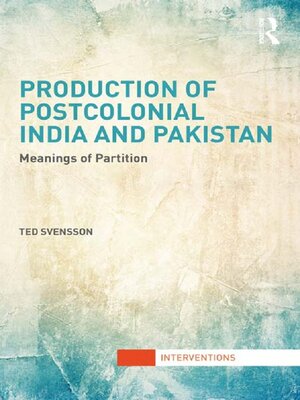Production of Postcolonial India and Pakistan
ebook ∣ Meanings of Partition · Interventions
By Ted Svensson

Sign up to save your library
With an OverDrive account, you can save your favorite libraries for at-a-glance information about availability. Find out more about OverDrive accounts.
Find this title in Libby, the library reading app by OverDrive.



Search for a digital library with this title
Title found at these libraries:
| Library Name | Distance |
|---|---|
| Loading... |
This work seeks to examine the event and concurrent transition that the inauguration of India and Pakistan as 'postcolonial' states in August 1947 constituted and effectuated.
Analysing India and Pakistan together in a parallel and mutually dependant reading, and utilizing primary data and archival materials, Svensson offers new insights into the current literature, seeking to conceptualise independence through partition and decolonisation in terms of novelty and as a 'restarting of time'.
Through his analysis, Svensson demonstrates the constitutive and inexorable entwinement of contingency and restoration, of openness and closure, in the establishment of the postcolonial state. It is maintained that those involved in instituting the new state in a moment devoid of fixity and foundation 'anchor' it in preceding beginnings. The work concludes with the proposition that the novelty should not only be regarded as contained in the moment of transition. It should also be seen as contained in the pledge, in the promise and the gesturing towards a future community.
Distinct from most other studies on the partition and independence the book assumes the constitutive moment as the focal point, offering a new approach to the study of partition in British India, decolonisation and the institutional of the postcolonial state. This work will be of great interest to students and scholars of international relations, South Asian studies and political and postcolonial theory.







